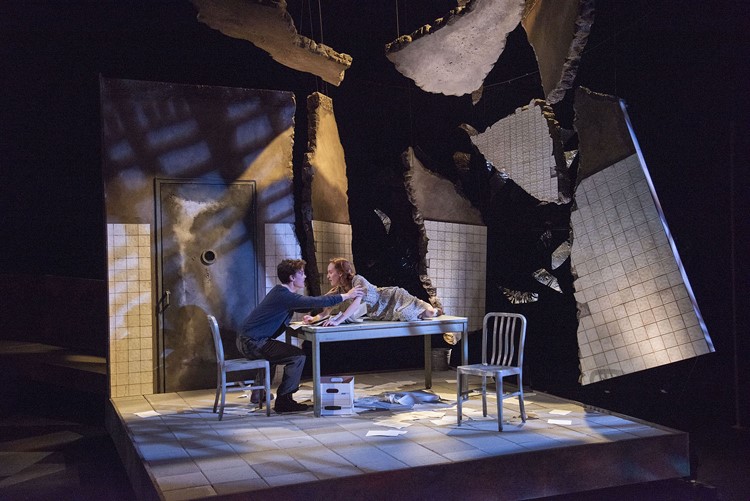We will not be silent, a story of Anti-fascist Youth

David Meyers’ We Will Not Be Silent, now playing at the New Repertory Theatre at the Mosesian Center for the Arts, Boston is a work whose content speaks to today’s audiences in the US. Many believe our democracy is in danger; our country is split, racism and other types of discrimination are widespread. Discussions and books on the rise of Fascism abound.
Most of the play takes place in an interrogation cell in Nazi Germany where Sophie Scholl (Sarah Oakes Muirhead) is being held. It is 1943 and the war is starting to go badly for Hitler. A year earlier Sophie, a religious Christian and student of philosophy at the University of Munich, and her brother Hans (Conor Proft), a medical student at the same university, had founded the White Rose, a small resistance group who believed that if the German people knew the extent of the evil being committed by the Nazis, they would oppose the regime. To enlighten the population, members of the White Rose wrote and secretly distributed anti-war pamphlets.
At the opening Sophie is alone sitting on a chair handcuffed. The cell contains another chair and a table. A door with a peephole opens onto a corridor. Symbolic of Germany’s growing impoverishment, the walls and ceiling are cracked.
After a wait Kurt Grunwald (Tim Spears) her interrogator enters. He is a somewhat mysterious character who seems to grow at times during the play. It is he who tells her that treason is punishable by death.
Sophie denies sharing the views of the White Rose. Grunwald explains that she will be freed if only she names those people who are involved in the group. As he tells her that she will die if she does not respond to his questions truthfully, he caresses her. Single handedly, he plays both bad cop and good cop. As the good cop, he kneels beside her, his arm around her shoulders pleading for answers. When she does not supply them, he slaps her. Then he asks her forgiveness.
To weaken her emotionally, he explains that the authorities discovered the pamphlets because people who found them brought them to the Gestapo. He tells her there is no God. To weaken her physically, he makes her stand for hours without food or drink, sometimes leaving her alone. That she continues to stand when he is not there shows her growing fear.
She loses her sense of time and is shocked when Grunwald tells her that she has been there only two days. He gives her water and chocolate which invigorate her a little. His role as an interrogator becomes less clear as he appears to be helping her. He warns her that if she does not confess, a harsher interrogator will take his place.
They begin to converse. She talks about her reasons for founding the White Rose. Grunwald takes off his jacket revealing the swastika on his shirt and defends his reasons for being a Nazi. At first Hitler improved the economy and life was good for those who were neither Jewish nor communists. Grunwald had a family to support. Again, he begs her to confess. When Grunwald leaves, the exhausted Sophie falls asleep on the table. In what seems to be a dream, her brother Hans who has also been arrested talks to her. Like the interrogator, he tempts her to confess saying that if she lives she can have a useful life.
The interrogator returns and informs Sophie that her trial is tomorrow. All she has to do to be saved is confess and pledge her allegiance to Hitler publicly. Otherwise, she will be guillotined. Grunwald predicts that if that happens she will be forgotten. Torn between her desires, Sophie chooses death. She and her brother were executed on the same day.
While the actors, particularly the leads Sarah Oakes Muirhead and Tim Spears, give strong performances, the play does not have the emotional impact that is needed to make it work. At points it becomes too conversational and too slow.
After the war, their elder sister Ingrid wrote a book about her siblings’ role in the White Rose. Other German books about the White Rose followed and were widely translated. As the White Rose became well known, authors in other countries also wrote about the courageous group.